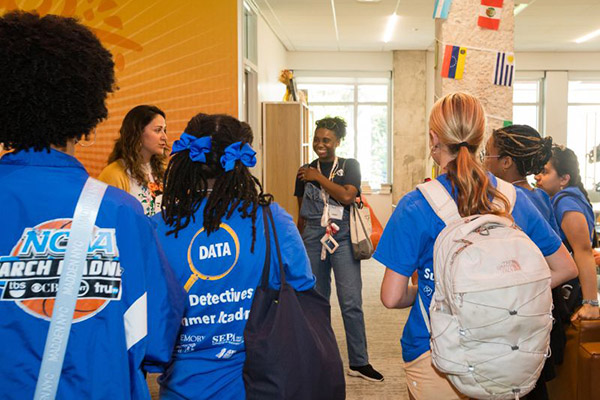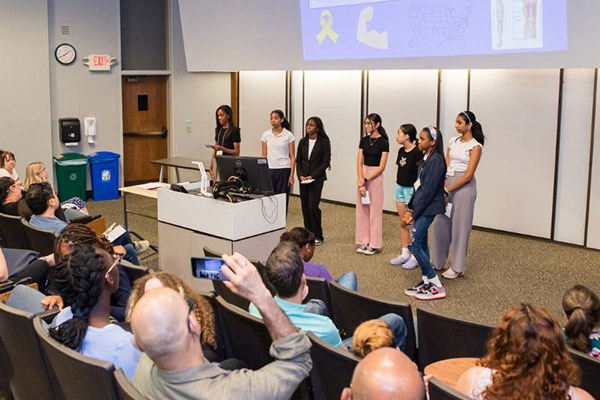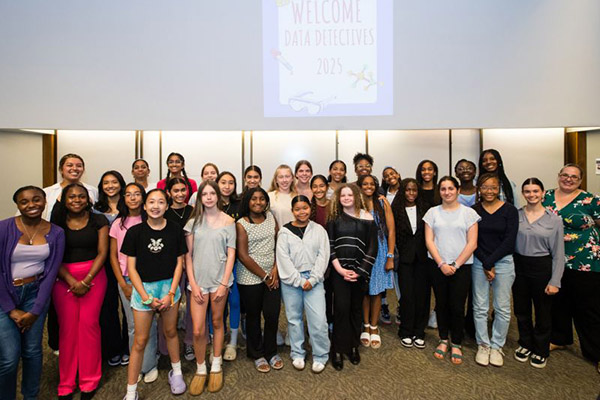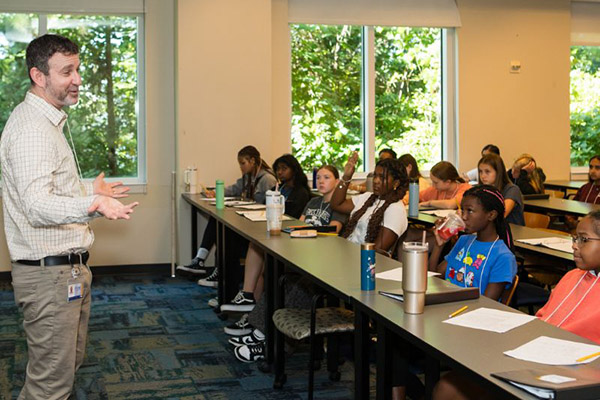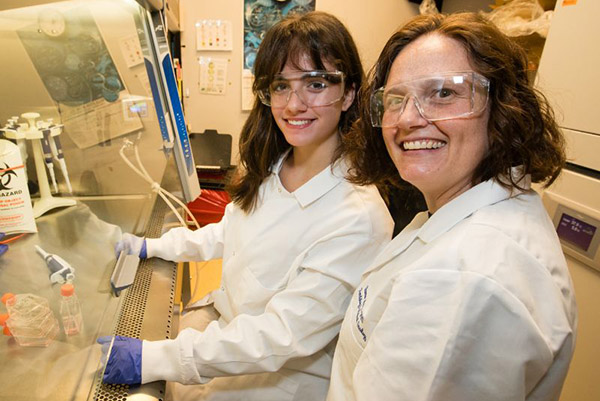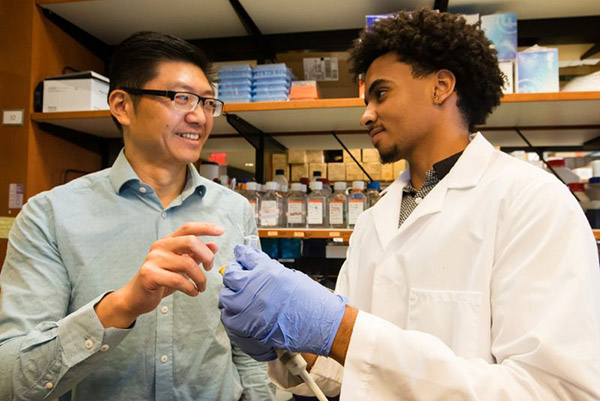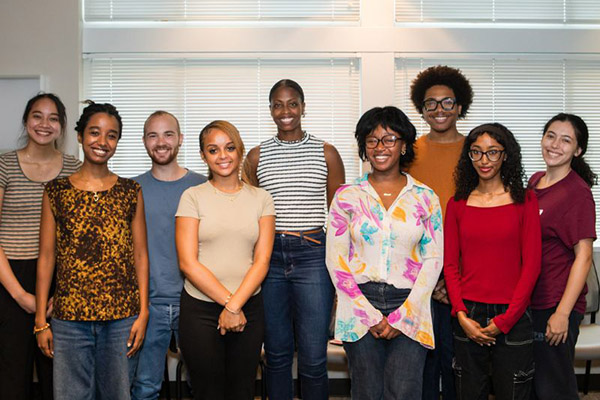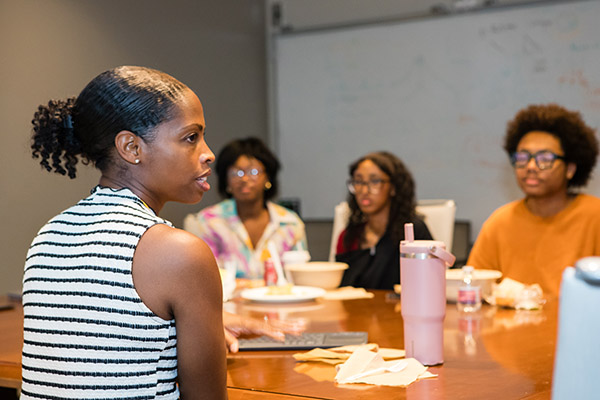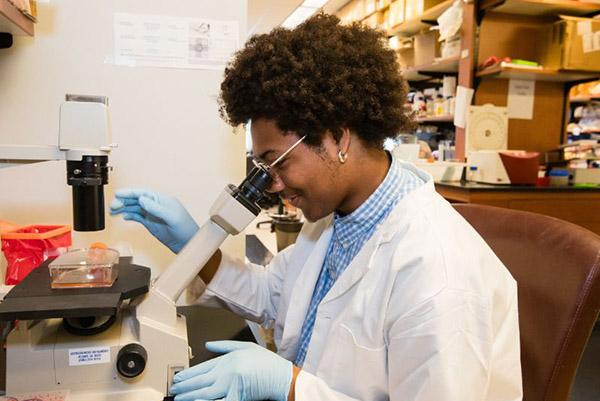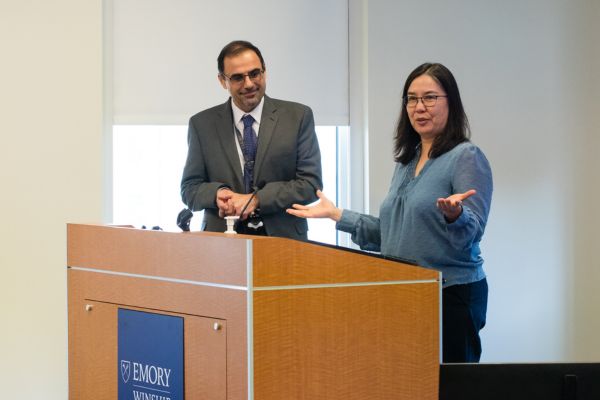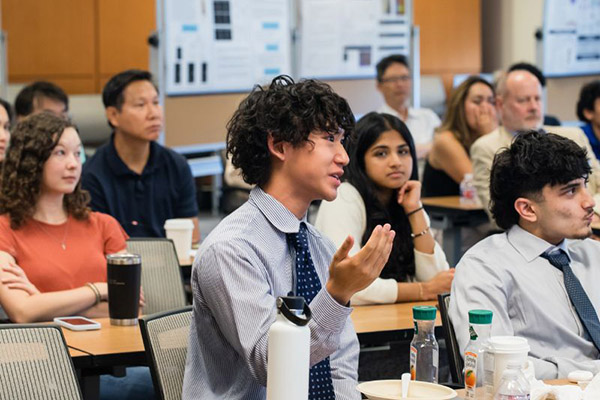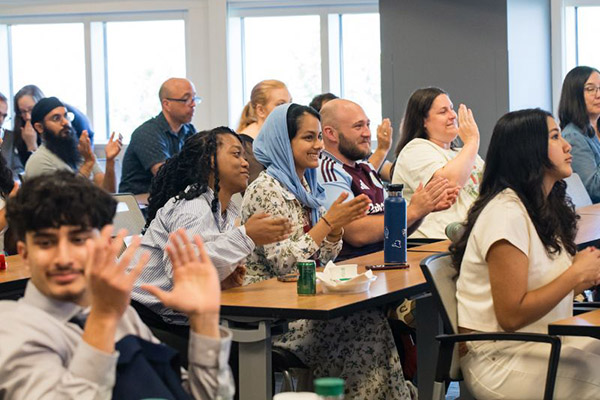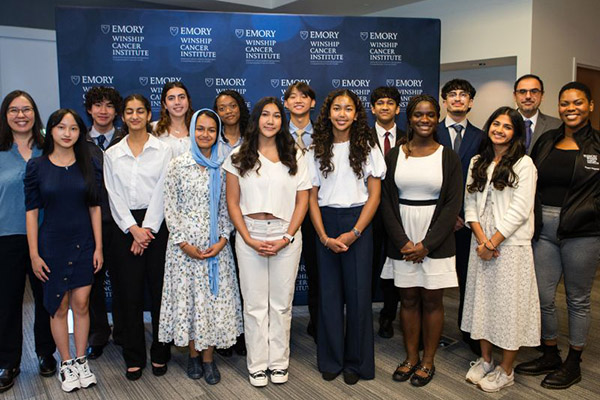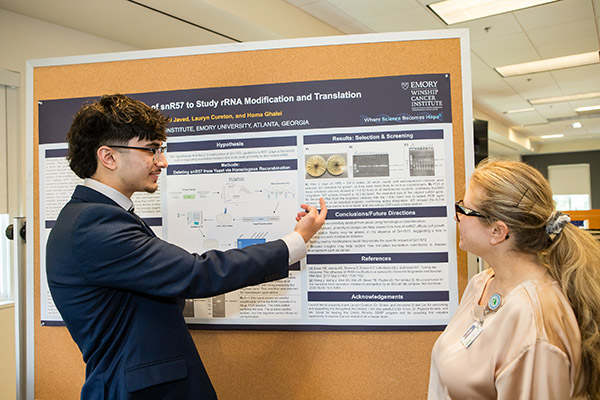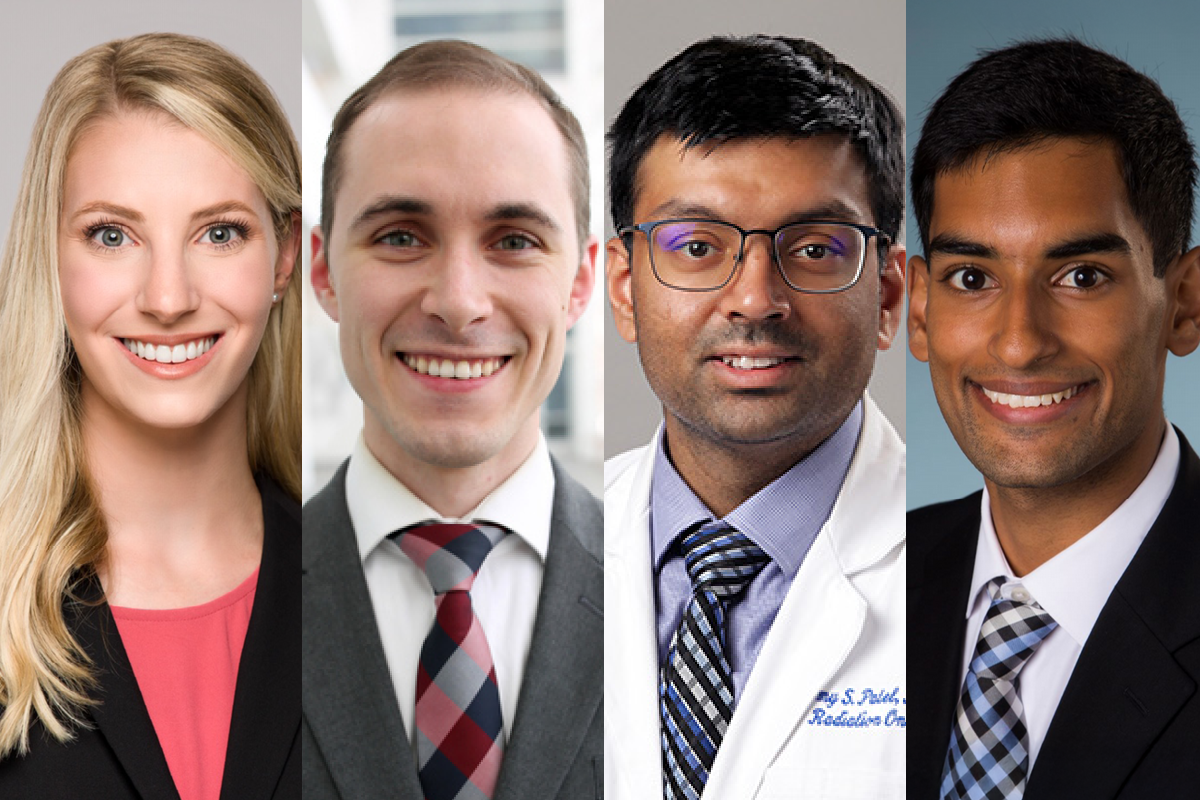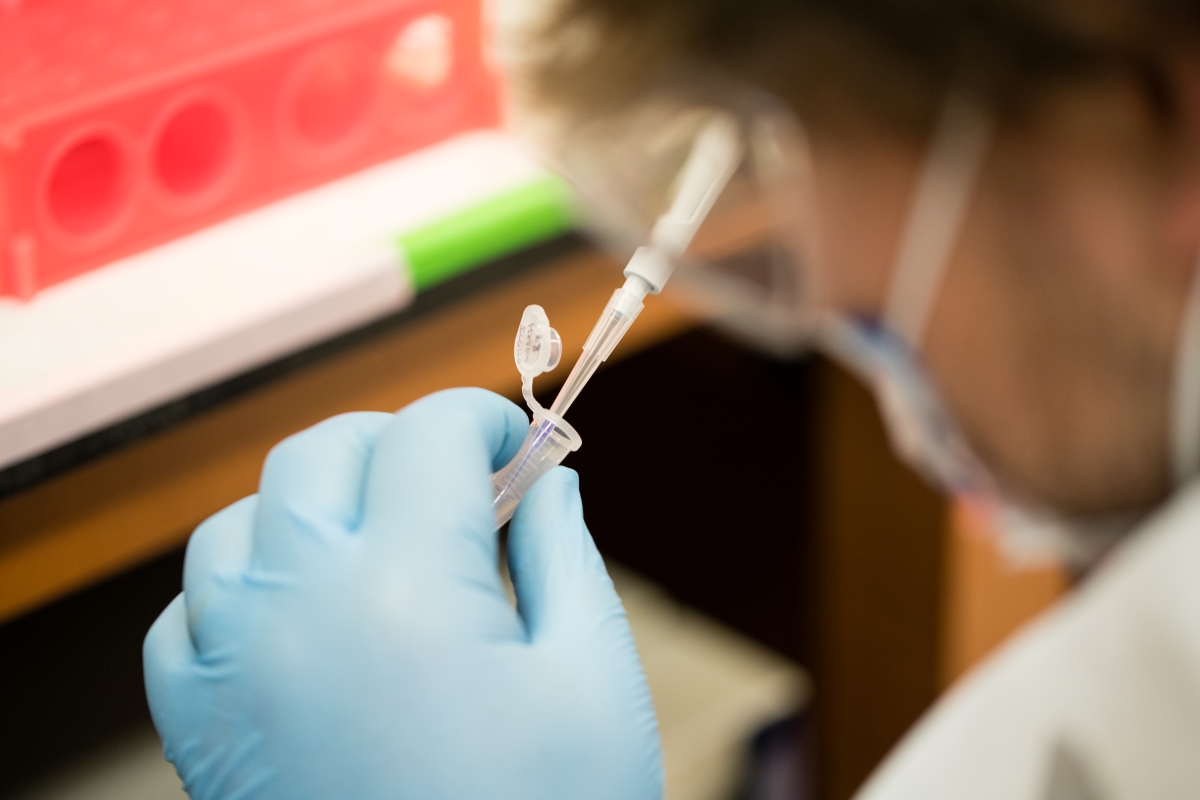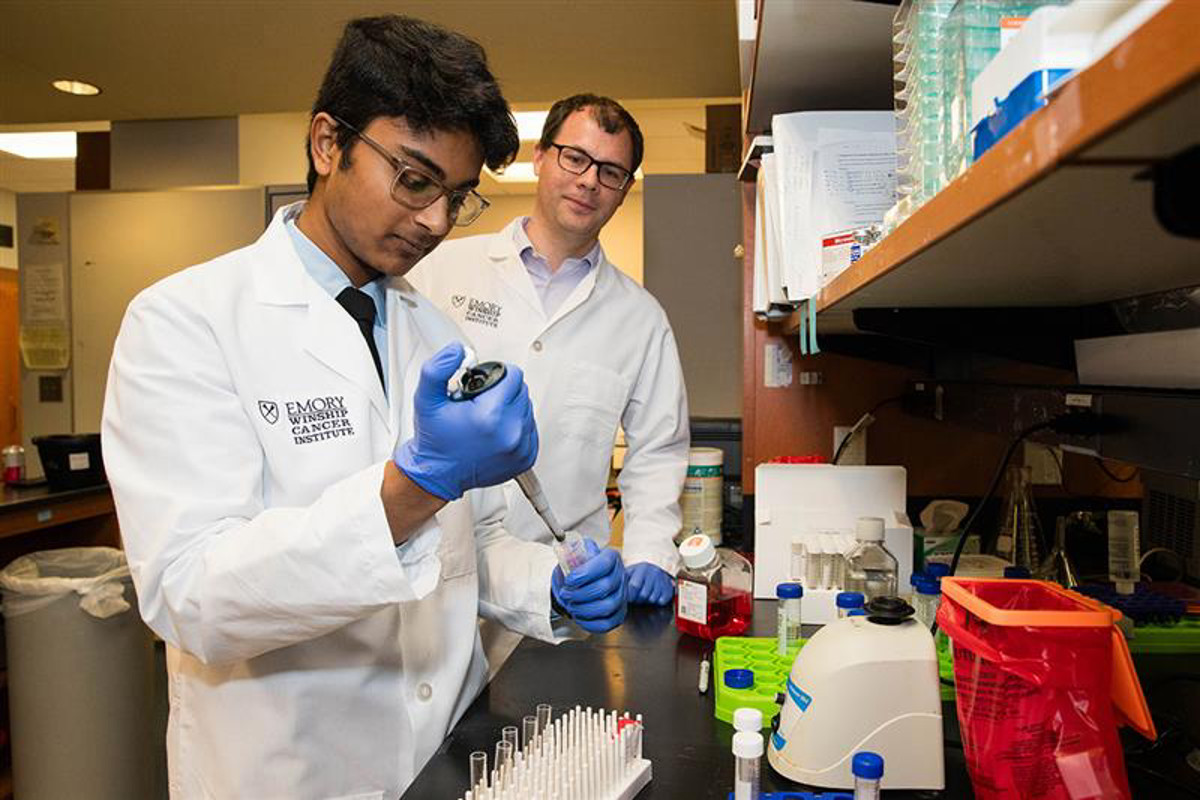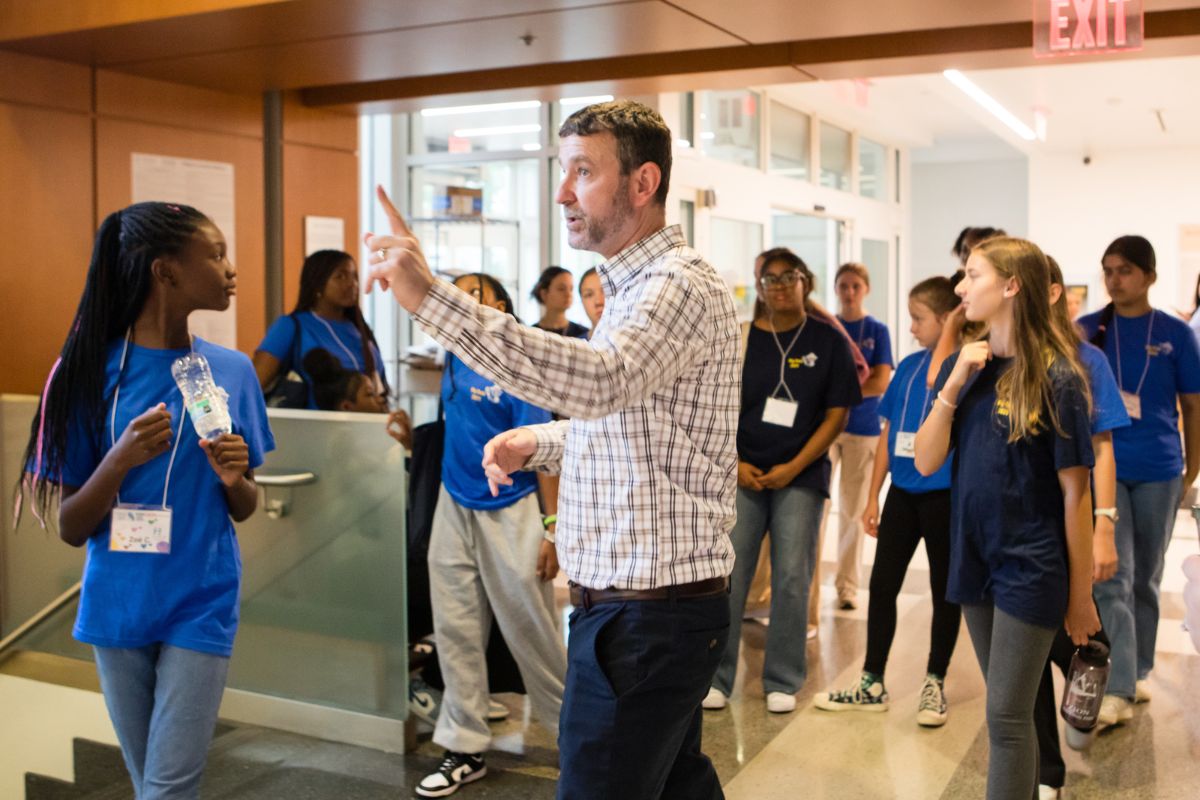
Adam Marcus, PhD, Winship's deputy director, leads Data Detectives students through Winship Cancer Institute's Clifton campus.
At Winship Cancer Institute of Emory University, the next generation of scientists is getting an early start. Through educational programs that begin as early as middle school, students gain unique, hands-on exposure to the world of cancer research and biomedical discovery. From analyzing real-world data to working alongside faculty in cutting-edge laboratories, these programs give learners a solid foundation and a viable pathway to studying or pursuing careers in science.
“Along with research and patient care, education and training are part of our tripartite mission at Winship,” says Lawrence Boise, PhD, Winship’s associate director for education and training. “These programs for K-12 and college students are the beginning of our pipeline to train the cancer workforce of the future.”
Made possible through grants, philanthropic support and institutional funding, Winship’s programs for middle school, high school and college students are provided at no cost to participants. That commitment ensures that students from all backgrounds have the chance to build critical skills and set a course to one day become a cancer research pioneer.
Data Detectives Big Data Summer Academy
In the Data Detectives program, rising 7th, 8th and 9th graders use real data to solve real-world, cancer-related health problems in one of two weeklong sessions held each summer. After-school programs are also held at Title I middle schools throughout the year. Funded by an educational research grant, the Science Education Partnership Award (SEPA) from the National Institute of General Medical Sciences (R25GM146271), Data Detectives is led by Theresa W. Gillespie, PhD, MA, BSN, FAAN, Winship’s associate director for cancer health equity and community engagement, and Winship Deputy Director Adam Marcus, PhD.
“Educational research grants include robust program evaluation and long-term follow-up of outcomes,” says Gillespie. “It is amazing to witness what innovative research projects these middle-school students can generate as a result of participating in the program and curriculum.”
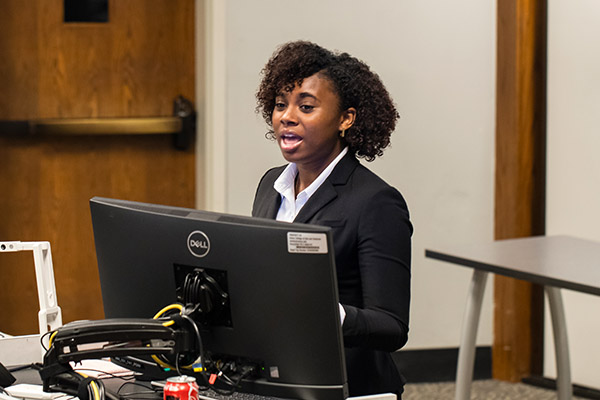
Jadyn Hill, Data Detectives alum and student program coordinator
Students attend lectures from Winship faculty on topics like cell biology, statistics, epidemiology and community health; gain hands-on experience with big data, artificial intelligence and machine learning with support from undergraduate and graduate student mentors at Emory, and learn about educational and career paths in STEM, data sciences and biomedical research. They work in teams to address community-based research questions and develop a community action plan to tackle these issues, which they present to families, staff, faculty and mentors on the last day of the program.
Data Detectives alum Jadyn Hill says the program introduced her to advanced biology, research methods and a broader sense of what a career in science could be. Hill became Data Detectives’ first junior mentor in high school and has served as a student program coordinator for the last two summers, wanting to support other curious young students just as she was supported. “The PIs and program director created room for me to grow,” says Hill, now a sophomore majoring in environmental science at Emory College of Arts and Sciences. “They entrusted me with responsibilities, supported my creativity and ideas, and genuinely invested in me.”
GA-YES Summer Research Program
Winship’s newest NIH cancer educational research program is GA-YES, which welcomed its first students in 2025. Funded by a Youth Enjoy Science grant from the National Cancer Institute (R25CA281836) to Gillespie and Marcus, the six-week program provides a cancer research training experience for rising high school juniors and seniors from rural Cherokee County, Georgia. Bus transportation is provided each day to Emory’s Atlanta campus, since rural students often face barriers to science and STEM activities due to distance from research universities and lack of access to other resources common to urban schools. Mentored by a Winship faculty member, students explore the underlying mechanisms, epidemiology, risks and potential interventions relevant to cancer. GA-YES also hosts year-round workshops with these students focused on their future careers in cancer and biomedical research.
“GA-YES is about opening doors—bringing students from rural Georgia into the heart of cancer research so they can see themselves as future scientists and changemakers,” says Marcus. “We designed GA-YES to connect the science of cancer to the lived experiences of these students and their communities. It’s about relevance, representation and opportunity.”
Summer Scholars Research Program
Every year since 2001, the Summer Scholars Research Program, sponsored by Lou Glenn, has given high school students a six-week, hands-on cancer research experience in a Winship lab. This year, six of the 12 host labs were in the Department of Hematology and Medical Oncology while the other six were in scientific departments across Emory’s campus.
“Our goal with this program is to provide students with an immersive experience in cancer research, introducing them to a broad range of research topics while allowing them to focus on a specific project in the laboratory with their mentor and research group,” says Winship researcher Cynthia Giver, PhD, co-director of the Summer Scholars Research Program and associate professor of hematology and medical oncology at Emory University School of Medicine.
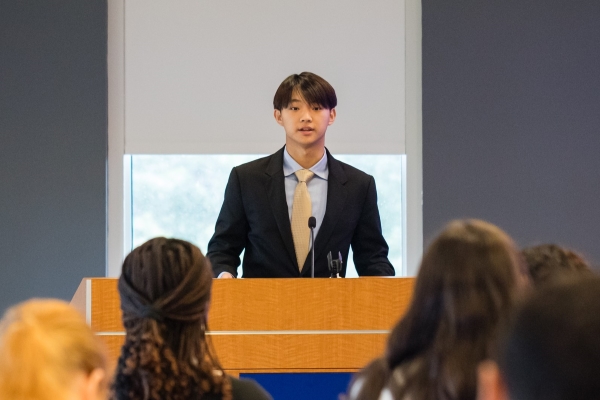
Andrew Guo, Summer Scholars Research Program student
For 2025 summer scholar Andrew Guo, the experience solidified his interest in combining clinical care with academic research as a potential career. "I was able to gain a broad understanding of cancer research and patient care across a diverse range of specialties while pursuing an in-depth research project aligned with my interest in basic science work," says Guo.
The 2025 curriculum featured 17 lectures, including a crash course in cancer biology and talks from Winship faculty highlighting their research areas and career paths; “near-peer” mentor sessions with undergraduate students who are program alumni; field trips including a behind-the-scenes tour of Winship clinical facilities; and a special panel discussion with cancer survivors. Students presented their summer research projects at a final symposium and poster session on July 18, describing their work in disease areas including, but not limited to, breast cancer, glioma, lung cancer, melanoma and multiple myeloma.
“This year marked another exceptional chapter for the Summer Scholars Research Program,” says Winship hematologist Nikolaos Papadantonakis, MD, PhD, MSc, who co-directs the program alongside Giver and is an associate professor of hematology and medical oncology at Emory University School of Medicine. “We had the privilege of witnessing the remarkable talent and dedication of our scholars, whose enthusiastic participation continues to inspire confidence in the future of medical oncology and hematology research.”
Summer Opportunity in Cancer Research Internship
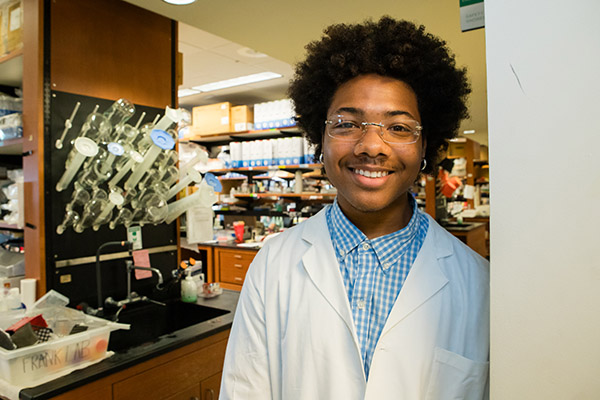
Anthony McIver, Summer Opportunity in Cancer Research intern
Rising Georgia Tech junior Anthony McIver was one of eight undergraduate interns in this year’s Summer Opportunity in Cancer Research at Winship, which Boise has directed since 2021. McIver also participated in the Summer Scholars Research Program in 2022 and worked in Boise’s lab when he was 17.
A biochemistry major with a social justice minor, McIver hopes to pursue an MD/PhD program focused on public health, epidemiology or cancer biology. “I saw the internship as an opportunity to explore different aspects of research and help me figure out what field I want to focus on when I apply to graduate school,” he says.
Supported by a grant from the American Cancer Society, the 10-week internship provides individual training, mentorship and career development to college sophomores, juniors and seniors. Interns conduct cancer research with a Winship faculty mentor in a lab and attend cancer-focused lectures from Winship members as well as seminars on education and professional development. The interns also have the opportunity to interact with graduate students from the Cancer Biology and MD/PhD graduate programs. At the end of the program, interns present their work at a poster symposium.
For McIver, the internship offered the ideal balance of guidance and autonomy to build confidence in his skills. “One of the most rewarding parts of this experience was having the independence to conduct experiments, analyze data and help decide the next steps for the project,” he says. “It really helped me grow and feel like an independent researcher.”
Educating for today and tomorrow
While each program is distinct, they share a common thread: opening doors to careers in science.
“These programs speak to the Winship educational mission, including the priority of reaching students throughout our catchment area of Georgia and meeting the needs of students from different backgrounds and experiences,” says Boise. “Each student who comes through our programs has the potential to make a difference in science, in medicine and in the lives of patients with cancer. We are fortunate to be able to interact with them and watch them grow.”

